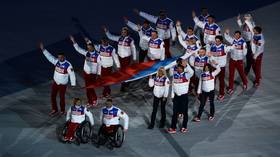Tragic reconciliation over Katyn tragedy
The tragic plane crash has not only prevented the symbolic reconciliation between Poland and Russia over the Katyn massacre but put an additional emotional shadow on the issue, says journalist Fred Weir.
The president was heading for a personal visit to the Katyn memorial site where Polish officers were murdered on the sidelines of World War II.
“Soviets blamed Katyn on the Nazis. They covered it up and denied it and only admitted it, I believe, in the dying days of the Soviet Union,” said the editor-in-chief of the Christian Science Monitor. “It’s one of the things really that’s hard to admit to. Russia had come around to admit to it. Ironically and tragically that was meant to be the moment of reconciliation.”
“It should be pointed out that this 70th anniversary of WWII Prime Minister Putin, I think, had a plan. On September 1, 2009 he went to Gdansk and participated in this conference dedicated to the 70th anniversary of WWII. Indeed, the Soviet Union has a lot to answer in historical terms to Poland – and the Hitler-Stalin pact was one of those things. I think Putin fairly subtly dialed back some previous Russian positions, some of Russian intransigencies and made an opening to Poland.”
The planned ceremony was especially important given that Kaczynski was not regarded as a friend of Russia, and was pressing for missile defense interceptors to be deployed in Poland and promoting the membership in NATO of Ukraine and Georgia, Weir noted.
“Russia will undoubtedly remember this awful tragedy, which happened not only on their soil, but in the very place [of the massacre],” the journalist concluded.
RT’s political commentator Peter Lavelle said “it is simply amazing that this would happen on this occasion because it was such an important event for [Kaczynski] politically.”
“This is classical Kaczynski: he was coming around, always in tune with trends. I think he was a little bit behind the curve here, but he was catching up. And reconciliation is on the agenda right now. It is very, very hard for both sides, by very definition it is,” he said.
Lavelle drew a parallel to the German-French relationship, which was “very bitter for centuries”. Yet “they were able to reconcile”, he said.
“Poland and Russia are going down that road right now,” he believes.
According to him, “Katyn is one of the most important historical events that young Poles – even to this day – know about.” Unfortunately, Lavelle added, “it is even very much in part of their identity.”
“This is a very painful thing for both sides,” However, he went on, it was the Soviet “secret services” who were behind the Katyn Massacre. “This was the Soviet Union that did this,” he said. But now there is a different country, Russia, he underlined.
“Let’s not get hysterical,” he said. “The reconciliation process was on its way and the progress was being made. And I compliment both sides during that process,” Lavelle said, adding that Kaczynski was part of that process.












